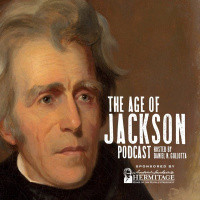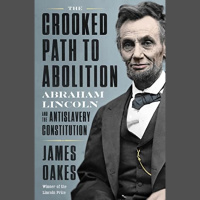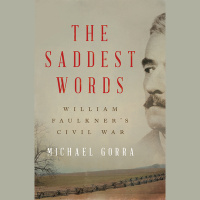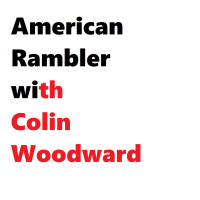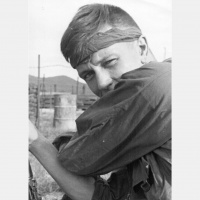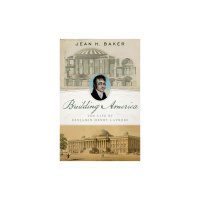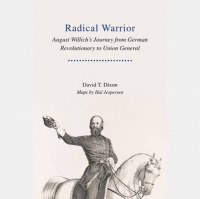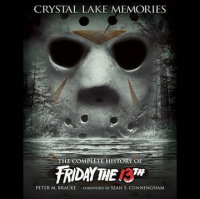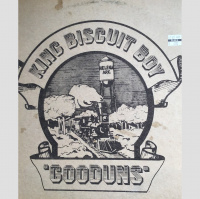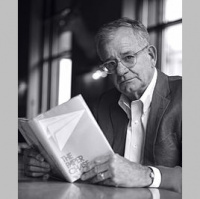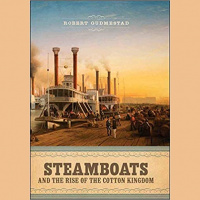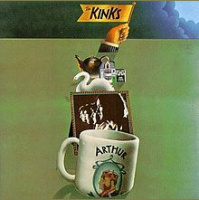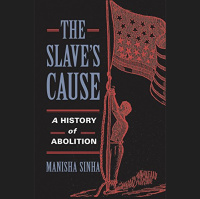American Rambler With Colin Woodward
- Author: Vários
- Narrator: Vários
- Publisher: Podcast
- Duration: 260:41:19
- More information
Informações:
Synopsis
Based in Richmond, Virginia, American Rambler discusses history, music, film, politics, and pop culture. The show is hosted by Colin Woodward, a historian, writer, and archivist. He is the author of Marching Masters: Slavery, Race, and the Confederate Army during the Civil War. He is revising a book on Johnny Cash.
Episodes
-
Episode 197: Dan Gullotta
25/02/2021 Duration: 01h21minDan Gullotta is the host of the popular Age of Jackson history podcast. A relatively recent arrival in the U.S. by way of Australia, Dan is a Ph.D. student of religious studies at Stanford University, though he is currently residing in Kansas. Dan is working on a dissertation that focuses on 19th century religion and how it influenced the development of the second party system in America. Dan talks with Colin about why he wanted to do a podcast, his love of his new homeland, and where America stands in terms of its historical consciousness. He also discusses what he doesn't like about Twitter, his friendship with Jacksonian scholar Sean Wilentz, and what it's like to address tricky and controversial topics on his podcast, such as the 2001 book Arming America.
-
Episode 196: The Kid Detective with Michael Scott
11/02/2021 Duration: 01h13minMovie detectives are as old as movies themselves. So what could a 2020 film add to the genre? Michael Scott, co-host of cinema podcast The Dana Buckler Show and his own film podcast Adkins Undisputed returns to American Rambler to discuss the recent crime noir/comedy/thriller The Kid Detective. It's a detective movie, but in addition to having a subtle comedic sense, it packs an emotional punch. The Kid Detective stars Adam Brody (of TV's The O.C. and Smallville) as Abe Applebaum, an early-30s, down-on-his-luck private investigator who gets his biggest case in years involving the murder of a high schooler. His snooping and probing lands him in a number of compromising and dangerous situations, ultimately leading him into the dark and evil recesses of small town life. It sounds like a million other movies, but The Kid Detective manages to do something clever and new. This is the first feature directed by Canadian Evan Morgan, who also wrote the film. It co-stars Canadian actor Sophie Nelisse as Abe's sidekick
-
Episode 195: James Oakes
28/01/2021 Duration: 01h15minJames Oakes is a two time winner of the Lincoln Prize for Civil War studies. But as he tells Colin, he initially went to college for business. An English teacher at Baruch College wisely turned him away from the world of international finance. Since then, he has made a name for himself as a scholar of 19th century history. Jim ended up attending Berkeley for graduate school during an astounding period in the department's history. He studied with Kenneth Stampp, whose book The Peculiar Institution Jim had read when he was still in high school. Also there at the time was Winthrop Jordan, Lawrence Levine, Charles Sellers, Charles Royster, William Gienapp, Albert Raboteau, and Leon Litwack. Before his dissertation was even done, Jim had a contract with Knopf for a book that was based on years of archival research at Duke and Chapel Hill. That book, The Ruling Race, took on the paternalism thesis put forth by Eugene Genovese in his landmark Roll, Jordan, Roll. Jim talks with Colin about his moves from New York t
-
Episode 194: Michael Gorra
10/01/2021 Duration: 01h31minMichael Gorra is a native of Connecticut who has taught at Smith College since the 1970s. A professor of English, his most recent book is The Saddest Words: William Faulkner's Civil War. This book builds on a career dedicated to examining writers such as Henry James and V. S. Naipaul. In Faulkner, Professor Gorra has tackled one of our most brilliant and baffling novelists. Raised on a steady diet of sci-fi, Michael entered college thinking he wanted to write novels. Or at least, he knew he didn't want to work in his father's fruit business. He ended up pursuing an English degree, though he he only came to the idea of being an academic later. As an undergrad at Amherst, he encountered the no-nonsense novelist Robert Stone and decided writing fiction wasn't for him. After decades of teaching, a prolonged stay in Germany in the late-90s helped open Michael's mind about the importance of place and history in writing. It certainly helped him when examining Faulkner. As The Saddest Words shows, few American writer
-
Episode 193: Country Boy: The Roots of Johnny Cash
03/01/2021 Duration: 51minColin gives a sneak peak at his January 6 "Legacies and Lunch" talk for the Central Arkansas Public Library in Little Rock. His talk will be on his upcoming book Country Boy: The Roots of Johnny Cash, coming out in the fall of 2021 from the University of Arkansas Press. Country Boy seeks to reclaim Cash for Arkansas. In the book, Colin examines Cash's upbringing in rural Arkansas, his rise to stardom, and the memorable concerts he gave in his home state. These included the concerts for Winthrop Rockefeller in 1968, at Cummins prison farm in 1969, his 1976 show in Rison, and his final Arkansas performance in Kingsland in 1994. Wherever he was in his life, Arkansas kept Cash grounded. No one has quite sounded like Johnny Cash, and his music came from a unique place: Arkansas.
-
Episode 192: Alan Farrell
22/12/2020 Duration: 01h29minIt's not often that Colin has a poet warrior on the podcast. It's been twenty years since Dr. Farrell taught at Hampden-Sydney College, where he was a professor of modern languages. He spent 27 years at HSC before moving on to VMI, where he was fired from being a dean after he said the wrong thing to a "fat guy in an expensive suit." Nevertheless, he enjoyed a long tenure as a teacher at VMI before his retirement to Unlucky Mountain near Lexington, where he lives and rides motorcycles. Alan grew up in New Hampshire, went to prep school in Connecticut, graduated with a bachelor's from Trinity College (where Colin went, too) before earning his Ph.D. from Tufts. But perhaps his most formative experience was serving in the Special Forces during the Vietnam War, where he stomped through the jungle with a copy of The Iliad in his trouser pocket. In Vietnam, he employed his knowledge of French with the local Hmong, who were engaged in counterinsurgency operations. America's counterinsurgency strategy in Vietnam was
-
Episode 191: Jean H. Baker
16/11/2020 Duration: 01h32minHistorian Jean Baker is a lifelong resident of Baltimore, so it makes sense that her most recent book is Building America: The Life of Benjamin Henry Latrobe. Her book on Latrobe is only the latest in a long and productive career that began as a graduate student at Johns Hopkins University. At Hopkins, she worked under the late, great, two-time Pulitzer Prize winner David Donald, whose students include Michael Holt, Robert Kenzer, and Bill Cooper (who have previously been on the podcast). True to her mentor's example, Dr. Baker's scholarship has combined political history and biography. Her subjects have included Mary Todd Lincoln, Margaret Sanger, the suffragettes, the Know-Nothings, and less-than-stellar 15th president, James Buchanan. Jean's days as a historian have included everything from teaching at Harvard and at a Maryland prison, to carpooling with nuns. She also reflects on what it's like being a female historian in a traditionally male-dominated industry. What has she learned from Mary Todd Lincol
-
Episode 190: David Dixon
02/11/2020 Duration: 01h15minDavid Dixon is the author of Radical Warrior: August Willich's Journey from German Revolutionary to Union General. Surprisingly, it is the first major biography of General Willich, whose life was the stuff of Hollywood movies. Willich was an aristocrat, born into a prominent family in Prussia. After growing up in the household of the philosopher Friedrich Schleiermacher, Willich pursued a military education before joining the army. Thus began his interesting and unconventional military career. Willich took part in a rebellion in Germany amid the revolutions running through Europe in the late 1840s. He could have been executed for treason, but he managed to escape to England. There, he continued fighting with others, including Karl Marx. In the 1850s, Willich moved to the U.S. and later joined the Union army. He proved a reliable and creative general, one of the best the North had in the western theater. He survived most of the major battles until a sharpshooter ended his military career in May of 1864. Willic
-
Episode 189: Friday the 13th with Michael Scott
27/10/2020 Duration: 01h16minHappy Halloween! Movie guru Michael Scott returns to the podcast to talk about his love for the Friday the 13th films. How did a low-budget 1980 horror movie spawn a franchise and draw in millions of fans? Is it all about the hockey mask? As it turns out, Michael's first foray into the series was Friday the 13th, Part VI: Jason Lives, which led him to devour the rest of the "Jason Movies." Michael has also read a few books on our friend Mr. Vorhees, including Crystal Lake Memories, written by author Peter M. Bracke. As Michael notes, Jason not only inspired numerous splatter flicks, the Friday the 13th films influenced non-horror movies, too, such as the Terminator and Rambo series. And yet, it's been more than ten years since the last Jason movie. Has Hollywood given up, or does Tinseltown just need a few good ideas? Have no fear, Colin and Michael have some thoughts. And it turns out Danny McBride may be the man to revive the series. You can check out Michael at the popular Dana Buckler Show movie podcast:
-
Episode 188: John Lingan
07/10/2020 Duration: 01h53minA native of Maryland, John Lingan's first book is Homeplace: A Southern Town, a Country Legend, and the Last Days of Mountain-Top Honky Tonk, which examines the northern Virginia town of Winchester. Winchester is known largely for two things: the Civil War and being the birthplace of Patsy Cline. But as John's book shows, just as compelling are the stories of more recent inhabitants, including chefs, writers, and store owners. Homeplace shows how people in 21st century South are trying to make a living in a region undergoing severe political and economic change. Homeplace builds upon John's other writings, which often explore music. Jeff Tweedy, NRBQ, Buddy Bolden, and Margo Price are just some of the subjects he has previously written about. Perhaps not surprisingly, his current book project centers on the classic rock staple Creedence Clearwater Revival.
-
Episode 187: James MacDonald
28/09/2020 Duration: 02h06minOnce again, Colin plays "Six Degrees of Court Carney," this time with fellow LSU veteran and historian James MacDonald. As is the case with Colin, James is a Damn Yankee who moved to the South as an adult and has never looked back. Oh, and like Colin, he married a southerner. James teaches at Northwestern State University of Louisiana in Natchitoches (pronounced "Nackadish"), a town so southern that it was the setting for the film Steel Magnolias. James talks about the teaching life, including how to cope with educating during the pandemic, wrestling with technology, what it's like to handle a 6-5 course load, and the lessons learned and not learned in graduate school. Also, James talks about growing up in New Jersey, visiting battlefields as a kid, his natural love of teaching, first-year grad school monasticism, and the unbearable heaviness of Phil Morgan's Slave Counterpoint.
-
Episode 185: Carytown Blues
18/09/2020 Duration: 17minAmerican Rambler talks about some new albums he got at Plan 9 Records in in Carytown in Richmond. Carytown seems to be losing businesses steadily, but Plan 9, thankfully, is still open. Yesterday, Colin picked up music from Margo Price, Blaze Foley, King Curtis, and King Biscuit Boy. The band County Kitchen takes us out with the song "Devil Dog," set in the old blues town of Helena, Arkansas.
-
Episode 186: Wayne Edmondson
14/09/2020 Duration: 01h43minWayne Edmondson is a high school teacher living in northern Louisiana. He and Colin are old friends and survivors of the LSU grad program in history. Colin stayed to finish his dissertation, but Wayne took a different path. In addition to studying at LSU, he's played in a rock band, been a sonar technician on a nuclear sub, surveyor in the Gulf of Mexico, funeral home assistant, disaster relief worker after Hurricane Katrina, and sweated out desert days as a contractor working on military bases in Iraq. Wayne talks about growing up in Louisiana, grad school, and seeing one of his professors nearly die at the podium. Wayne also discusses teaching, the benefits of being a morning person, and some strategies for motivating students (which sometimes involves doing lots of pushups).
-
Episode 184: Tim Van Den Hoff
30/08/2020 Duration: 01h12minIt's fitting that Colin and Tim talked on the anniversary of the deadly Unite the Right rally in Charlottesville, Virginia. That's because Tim's recent documentary Monumental Crossroads (link below) examines the debate over Confederate memorials and the meaning of the Civil War in the South. Taking his camera to locations in Louisiana, Tennessee, Virginia, and Alabama, Tim's film interviews white and black people to understand their feelings about some of the most divisive symbols in the American landscape. Monumental Crossroads shows us a cross-section of the South, from a black artists and politicians to white members of Confederate groups as well as an African American "Confederate" in Asheville and Tennessee Civil War interpreters. Tim, a native of the Netherlands, makes clear that no society is free of racism (as in the case of the Netherlands' "Black Pete"), though some are better than others at confronting their troubled past. Colin and Tim discuss the difficulties surrounding racial healing amid a sum
-
Episode 183: John Jay Osborn, Jr.
24/08/2020 Duration: 01h13minJohn Jay Osborn, Jr., is perhaps best known for his 1971 novel The Paper Chase, which was made into an Oscar-winning movie starring John Houseman (with whom John became friends). The book was based on John's experiences at Harvard Law School and centers on James T. Hart, a bright, ambitious, first-year student trying to balance his studies and tumultuous personal life. The book sold well and the film was a success, but John never abandoned the law. The Papers Chase, nevertheless, led to John spending 15 years in Hollywood as a scriptwriter and advisor. He worked on the TV adaptation of The Paper Chase as well as shows such as L.A. Law and Spencer for Hire. He also was the creator of the show The Associates, based on his second novel. In 2018, after a long hiatus, John published a novel about a troubled relationship called Listen to the Marriage. That book, too, is being made into a movie. John talks with Colin about his roots in New York, the Osborn family's flight to California, writing The Paper Chase, and
-
Episode 182: Chris Leahy
08/08/2020 Duration: 01h25minChris Leahy was a fellow traveler with Colin in his days at LSU. Since 2007, he's been a professor a Keuka College in upstate New York. He has a new book out, President without a Party: A Life of John Tyler (LSU Press, 2020). His biography began as a dissertation in Baton Rouge, where Chris studied under the imposing William J. Cooper (a previous podcast guest on American Rambler). Chris talks with Colin about his days at LSU as well as growing up in Baltimore and his time at Virginia Tech. Chris has been working on his biography for more than 20 years. Born in the first years of the American republic into a Tidewater planter family, Virginia's John Tyler isn't one of the better known presidents. But his career in politics serves as an example of how a man can find himself accidentally put into a position of power and then find he doesn't really belong in any political camp. Tyler might have been U.S. president, but he ended his life loyal to the Confederacy. He died in early 1862, just before taking his plac
-
Episode 181: Barclay Key
23/07/2020 Duration: 01h31minBarclay Key is a history professor at the University of Arkansas at Little Rock. He's a native of north Alabama, who was born into a working class family of farmers and textile workers. His father picked cotton before going to college and becoming a teacher. Barclay's Alabama roots help explain why he's a huge fan of Muscle Shoals area rockers Drive-By Truckers, whose music he has used in his history classes. Since graduating from the University of Florida, Dr. Key has traveled the world courtesy of Fulbright Scholarships that allowed him to teach in Poland and Mexico. He is back in Little Rock now, and earlier this year, Barclay published his first book, Race and Restoration: Churches of Christ and the Black Freedom Struggle. He talks about what it was like to grow up in that faith, and how the Churches of Christ confronted the problem of race in the mid-20th century. Barclay also talks with Colin about a new research project of his that examines a bombing in Little Rock during the civil rights era, and the
-
Episode 180: Robert Gudmestad
17/07/2020 Duration: 01h28minRobert Gudmestad is a native of Minnesota who teaches history at Colorado State University in Fort Collins. He knows Colin from his days as a grad student at LSU, where they both worked with the imposing figure of Charles Royster, the late scholar of the Early Republic, the Civil War, and colonial Vietnam. Bob is the author of two books, A Troublesome Commerce (2003), about the domestic slave trade, and Steamboats and the Rise of the Cotton Kingdom (2011). As he tells Colin, he never approached his career with much of a plan. He had a good job before he attended grad school. Even so, he decided doing history was a better fit for him. That journey took him to Richmond and then Baton Rouge, where he enjoyed good food, football, and the pleasures of a monastic academic existence. Recorded in early June, Colin and Rob talk about the then growing Black Lives Matter protests and the fate of Confederate monuments. They reflect on he eccentric side of professional historians, and discuss at length Bob's new research
-
Episode 179: Mark Doyle
29/06/2020 Duration: 01h26minMark Doyle is a professor of history at Middle Tennessee State University. A native of Oklahoma who now resides in Nashville, he has lived for extended periods in New Orleans, Boston, and Ireland. His latest book is The Kinks: Songs of the Semi-Detached. Mark and Colin talk about the historical and sociological background of the Kinks' golden period in the late 1960s and early 1970s. More specifically, they discuss how the brilliant and multi-faceted Ray Davies, the Kinks' main songwriter and singer, commented on the profound changes going on around him. In the process, he and the Kinks made classic albums such as Something Else, Village Green Preservation Society, Arthur, Lola, and Muswell Hillbillies. Mark and Colin also examine the challenges of doing a different kind of writing, namely, how historians trained in a doctoral program examine a pop culture subject. As Mark sees it, he didn't want to write a typical history of the band. And while interviewing someone in the Kinks would have been fun and exciti
-
Episode 178: Manisha Sinha
15/06/2020 Duration: 01h09minManisha Sinha was born in India, but she moved to the U.S. to finish her education. Since graduating with a Ph.D. from Columbia--where she studied under Eric Foner--she has made an impact on the history world. Her first book, The Counterrevolution of Slavery (2000), based on her dissertation, was nominated for the Bancroft Prize. A few years ago, Politico named it as one of the ten books on slavery "you need to read." Her most recent book, The Slave's Cause: A History of Abolition (2016) won the coveted Frederick Douglass Prize. Dr. Sinha stays busy. She lives in Massachusetts, but commutes to the University of Connecticut, where she is the Draper Chair in American History. She is hard at work on her next book, which examines the Reconstruction era. Manisha talks with Colin about the publishing field, what it's like to cut 1/4 million words form a manuscript, and her appearance on The Daily Show during the Obama years.

